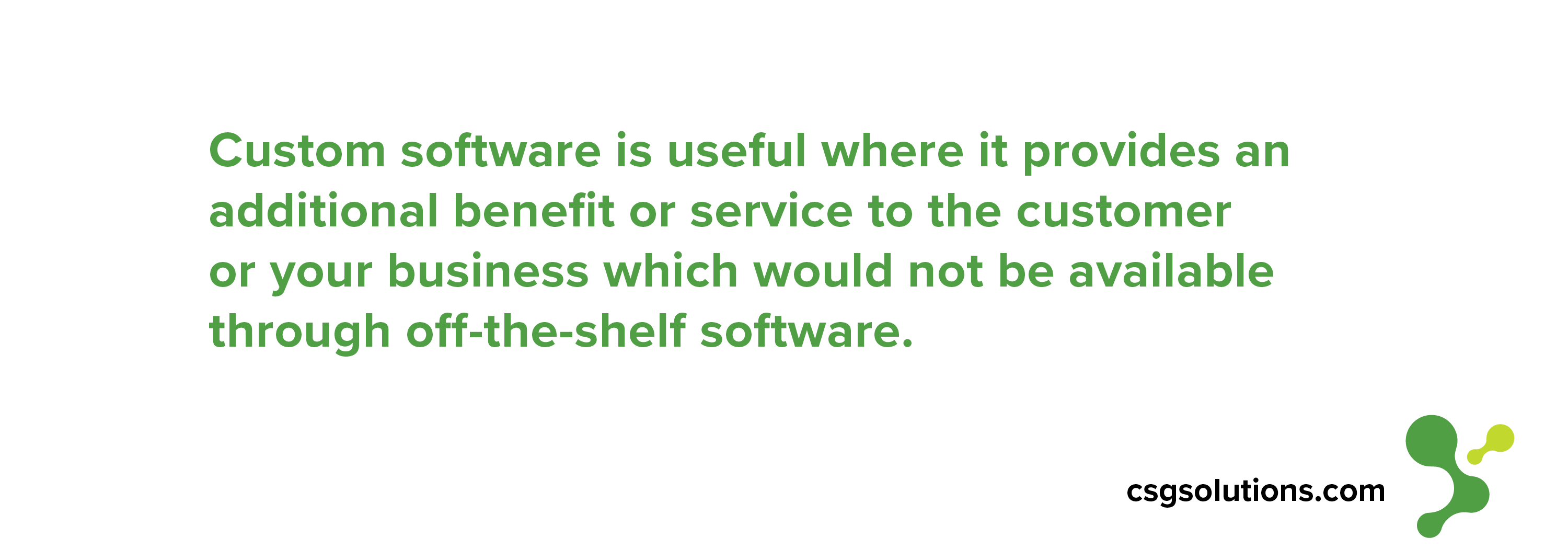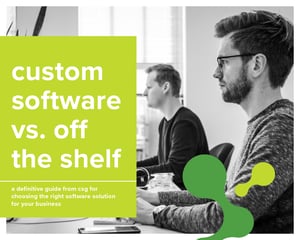Off-the-shelf or Artisan Crafted software?
Everyone loves when something feels customized and one-of-a-kind. It is perfectly understandable why women may adore custom-created items such as a wedding dress which fits absolutely perfectly, or how a man "feels like a million bucks" when he's wearing a custom-tailored suit. When something fits "only you" it is uniquely special.
Customization is, in fact, an intrinsic part of many business models. Consider Starbucks, where they're not just selling coffee, they are selling your coffee which comes with "half-fat, light foam, one shot of butterscotch, and just a dusting of cinnamon" …and then it has your name on the cup…
How valuable is custom software?
The value of a custom software solution largely depends on what you do with it. If you're writing a document, programs like Microsoft™ Word are ubiquitous, functional, and well-understood by most people. It would be highly unusual if you needed custom software for something as commonplace as document creation. The same could be said for spreadsheets, or most presentation programs. Custom development in those instances simply doesn't make sense and wouldn't provide any more value for the increased investment.
As a simple business example, the small, fast oil-change shop has access to off-the-shelf (OTS) software for inventory control and for bookkeeping purposes. It was built for their industry, but doesn’t have to be specifically built for their business. Nothing special is required to run their shop that would be different from a competitor down the street, and they wouldn't gain any special advantage over their competitor by trying to reinvent the wheel with their own software.
But can you imagine a circumstance where Microsoft ran its financial empire on Intuit's Quickbooks bookkeeping system? Would IBM use Wave Accounting because it's "free"? Ridiculous, of course—their business models are far too complex to run on anything less than software written precisely for them which allows them to automate their unique business processes, saving both time and money.
in what situations is a custom software solution most useful?
Custom software is useful where it provides an additional benefit or service to the customer or your business which would not be available through off-the-shelf software. As an example, think about healthcare data spread across a regional healthcare provider. #teamcsg recently helped a regional healthcare provider unify data buried in multiple systems across hospitals, doctor’s offices, rehab facilities, and other providers to identify inefficiency and find savings of over 50 million. There is no way a solution like this could be created using off-the-shelf software, and the value of the solution was completely justified by the increased efficiency across the organization and the cost savings generated.

Custom software is often more efficient than off-the-shelf solutions
As another example, #teamcsg created a custom software application that allowed a firm's sales employees to efficiently look up product information and produce quotes on the spot, rather than going back to the office and manually creating a proposal. The application merged customer and contract information using the firm's CRM (Customer Relationship Management system), provided detailed product information, and produced quotes all on an iPad- all on-site. This led to a better customer experience and improved the efficiency of the sales team, giving them more time to spend with prospects and customers and less time doing paperwork in the office.
Custom software can reduce costs
Have you considered the full cost of your off-the-shelf solution to determine if it truly is more cost effective than a custom one? Are you further ahead to pay the annual licensing fee for all 280 of your computers, or could you invest in custom development of a proprietary program that you own forever and won't have to pay ongoing licensing fees for? Sometimes it makes sense to pay annual maintenance fees for your off-the-shelf solution, but sometimes it doesn’t.
Although the subscription-based nature of off-the-shelf software allows you to spread out your investment over time, those licensing fees can still add up, and you're committed to paying them as long as you're using the software. With the right custom software provider, you can design a solution that suits the long-term needs of your business, minimizing the need for modification and further expense as much as possible.
The Takeaway
Off-the-shelf software is often the right solution. However, when you find yourself or your organization trying to solve the intrinsic problems of making off-the-shelf software fit your business process, or even worse, you find yourself modifying your business process to fit the software, it’s time to stop and think about the alternative.
Sometimes custom software is just the obvious answer. If it makes your company better or if it aids your customers, there should be no question about adopting it. When conventional solutions are cheaper, faster, and sufficient, save the custom solution for problems where you can create a competitive advantage. The advantages conferred by customized software solutions really can't be overstated.
Custom software can help you:
- Ease organizational growing pains
- Improve internal organization and efficiency
- Improve access to information and streamlining information sharing
- Ensure consistency of information across the organization
- Streamline workflows
- Serve the unique needs of key clients, leading to increased retention and opportunities for demonstrating capability to prospective clients
- Harness opportunities to expand into new markets
- Increase data availability and improve ease of reporting
- And so much more …
To learn some tell-tale signs that it's time for your company to switch to a custom solution as well as more about the custom software build process, read this helpful article.
Custom Software or Off-the-Shelf?
You’ve identified an area of your business that has room for improvement, whether that be in the form of an opportunity to streamline your operations, or the chance to capitalize on a new revenue stream. In order to create this improvement you’ll need a capable piece of business software. In this ebook, you’ll learn what to consider when building custom software vs. buying off the shelf.
Are you considering a custom software solution?
Read our breakdown of the pros and cons of off the shelf vs. custom software.



